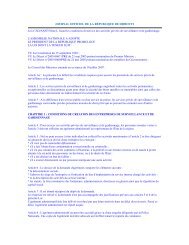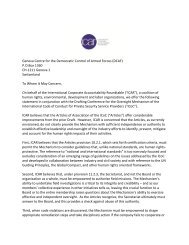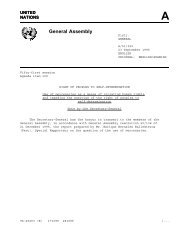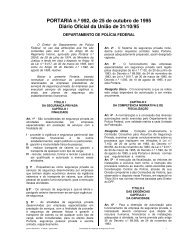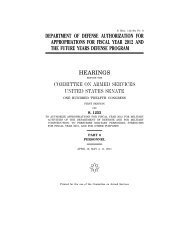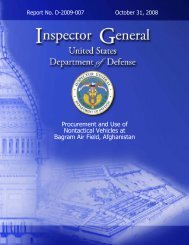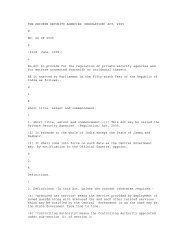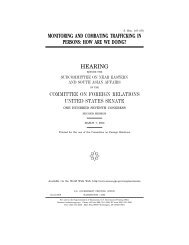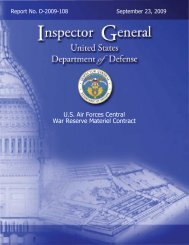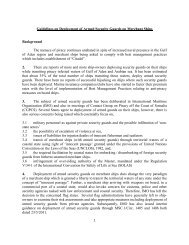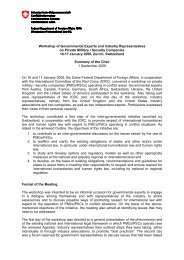Security Assistance; and Logistics - Federation of American Scientists
Security Assistance; and Logistics - Federation of American Scientists
Security Assistance; and Logistics - Federation of American Scientists
Create successful ePaper yourself
Turn your PDF publications into a flip-book with our unique Google optimized e-Paper software.
Pre-deployment TrainingAll mentors received approximately 60 days <strong>of</strong> pre-deployment combat skills training atFort Riley, Kansas <strong>and</strong> 1 week <strong>of</strong> additional training in Kuwait prior to their arrival inIraq. This training focused on combat skills <strong>and</strong> convoy operations. This training hasbeen reported by Coalition medical personnel in Iraq to be insufficient preparation forcross-cultural medical mentoring in the ISF setting.Preparation for Medical Mentoring in IraqShort-term deployments, lack <strong>of</strong> health systems developmental experience, <strong>and</strong> lack <strong>of</strong>preparation for cross-cultural medical mentoring will likely limit the effectiveness <strong>of</strong>efforts by U.S. military <strong>and</strong> civilian mentors <strong>and</strong> trainers in Iraq, as it has in Afghanistan.In addition, the multiple tasking <strong>of</strong> personnel <strong>and</strong> the relegation <strong>of</strong> efforts to build asustainable Iraqi Army health care delivery system to secondary status relative toCoalition support precluded an adequate focus on Iraqi health sector engagement.DoD efforts to support the reconstruction, training, <strong>and</strong> organizing <strong>of</strong> the Iraqi Armyhealth care system were complicated by the 6 to 12 month deployment cycles <strong>of</strong> U.S.military personnel, which limited continuity, effective mentoring, <strong>and</strong> sustainableprogress. However, additional pre-deployment training <strong>and</strong> preparation may partiallycompensate for shorter lengths <strong>of</strong> deployments.The Center for Disaster <strong>and</strong> Humanitarian <strong>Assistance</strong> Medicine at the UniformedServices University <strong>of</strong> the Health Sciences has prepared a draft training curriculum formedical Embedded Training Teams, Police Mentor Teams, <strong>and</strong> ProvincialReconstruction Team members in Afghanistan as an initial effort to improve the focus forpre-deployment training. This curriculum may be applicable to mentoring practices inIraq, as it includes many aspects <strong>of</strong> medical reconstruction <strong>and</strong> development that arecommon to both Embedded Training Team <strong>and</strong> Police Mentor Team missions.According to the Comm<strong>and</strong>ing General, Combined <strong>Security</strong> Transition Comm<strong>and</strong>-Afghanistan, this additional pre-deployment training should be provided before servicemembers deploy from the U.S. to minimize the training footprint in theater. Providingsuch training in theater is difficult due to time, travel, force protection, <strong>and</strong> operationaltempo constraints.Recommendations, Client Comments, <strong>and</strong> OurResponse20.a.(1) We recommend that the Comm<strong>and</strong>er, Multi-National Force-Iraq assignsufficient priority to medical mentoring <strong>of</strong> the Iraqi Army to effectively developsustainable combat services support capabilities in the medical area; <strong>and</strong> develop acomprehensive, phased, detailed, <strong>and</strong> integrated multi-year medical mentoring plan thatprioritizes <strong>and</strong> synchronizes mentoring efforts <strong>and</strong> that links together strategic,operational, <strong>and</strong> tactical mentoring steps required in the mentoring plan.142



